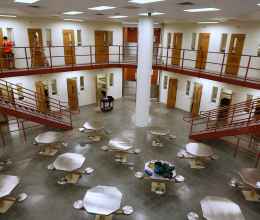In its 100 years, the ACLU SoCal has won key civil liberty victories. But as the co-founder of the ACLU, Roger Baldwin, once said, “The battle for civil liberties never stays won.”
A prime example of that is the lawsuit, Rutherford v. Pitchess, also known simply as Rutherford.
First filed in 1975 by the ACLU SoCal, it exposed horrific conditions at the Los Angeles County Jails so dire that they violated the constitutional right against cruel and unusual punishment. Three years later, the judge in the case, William Gray, issued a historic decision that largely agreed.
Gray took it upon himself to visit overcrowded jails, unannounced, and he described some aspects of them to be “constitutionally intolerable.” He especially railed against the drastically crowded holding cells used for when people in the jails were transported to courts.
“The sight of from 20 to 54 men being crammed into a fourteen-foot cell is a repelling experience in any society that takes pride in its high concepts of human dignity,” Gray said. “The closest comparison that I can draw to such a spectacle is that of an overcrowded pig pen.”
He also found it “intolerable” that there were not enough beds for men, forcing them to sleep on mattresses on concrete floors, providing “poor examples of the civilized standards and concepts of dignity, humanity, and decency.”
Gray mandated that steps be taken to alleviate overcrowding, plus other matters including the lack of clean clothing, inadequate exercise, insufficient time to eat meals, and the lack of telephone access.
Gray died in 1992, but the Rutherford case unfortunately lived on.
In 2005, the ACLU SoCal filed court documents saying the county sheriff’s department and board of supervisors were defying the Rutherford decision, especially in the Inmate Reception Center (IRC) where people are processed when they first enter the county jail after an arrest. “Thirty to forty men are being crammed into holding cells so small they must take turns lying down on the hard, filthy floor,” the filing said, with no access to showers or even regular meals.
Judge Dean Pregerson toured a jail and did not hide his disgust. Calling the conditions “inconsistent with basic human values.” He issued a ruling in 2006 aimed at severely restricting overcrowding and ordering county officials to develop a comprehensive plan to improve conditions.
Improvements in the name of Rutherford eventually deteriorated. In the summer of 2022, ACLU SoCal Senior Staff Attorney Melissa Camacho walked into the IRC and found conditions had grown even more hellish, including:
- Dozens of people crammed together, sleeping head-to-foot on the hard concrete floor.
- People defecating in trash cans and urinating on the floor or in empty food containers in shared spaces.
- Unhygienic conditions, including floors littered with trash, overflowing sinks and toilets, no access to showers or clean clothes for days, and lack of adequate access to drinking water and food.
- Failure to provide adequate health care, including failure to provide people with serious medical conditions their medications, or to provide care to people dangerously detoxing from drugs and alcohol.
A man named Gilbert P. talked with Melissa on his third day at IRC with no mattress, drinking water, and a painful rash all over his body. He said simply, “It is a living hell in here.” The filing especially noted the mistreatment of people with mental illnesses, saying they were chained to chairs for days at a time, where they slept sitting up and had limited access to toilets or drinking water.
The horrific conditions were so blatant that the county did not challenge the filing, and Judge Pregerson issued a temporary restraining order, prohibiting keeping people in the IRC beyond 24 hours and banning the chaining of anyone to a chair for more than four hours. Jail officials were also ordered to provide functional toilets, drinking water, and medical care.
Alarmingly, the county could not meet these basic minimal requirements.
In February of this year, the ACLU SoCal and ACLU National Prison Project filed a motion saying that the county was “massively out of compliance” with Judge Pregerson’s order.
“After almost five decades of an endless cycle of promises followed by excuses and failures and generations of class members enduring abysmal conditions,” the filing said, “the time for talk is over.”
Perhaps it was that threat of contempt that helped bring about a historic settlement.
In June 2023, Judge Pregerson approved an agreement that made permanent several of the items that were in the temporary restraining order. The most extraordinary provision of the settlement went to the very heart of Rutherford — overcrowding. The agreement required that the county create at least 1,925 new community beds in non-jail situations as alternatives to jailing people with mental illnesses. Close to 1,700 of those new placements will be operational within the next two years.
It’s a revolutionary approach for L.A. County Jails, rooted in a lawsuit that is 48 years old.
Almost half a century later, one question remains unanswered.
Will the latest Rutherford filing finally be successful in getting the county to take seriously the lack of “dignity, humanity, and decency” in its jails and stop the senseless overcrowding and needless caging of some of our most vulnerable L.A. County residents?
ACLU SoCal Chief Counsel Peter Eliasberg answers this question best: “they’re committing to doing that now [but] we will be monitoring closely to see that they do.”
This article is part of the ACLU SoCal's centennial series, exploring the affiliate's long and evolving work and impact in the southland. The series lifts historic milestones and facts documented in the "Open Forum," the ACLU SoCal's newsletter published from 1924 to 2004. This year, in partnership with the California Historical Society, the ACLU SoCal has published and digitized the "Open Forum" in its entirety. Explore the archives and read more about the ACLU SoCal's history.
